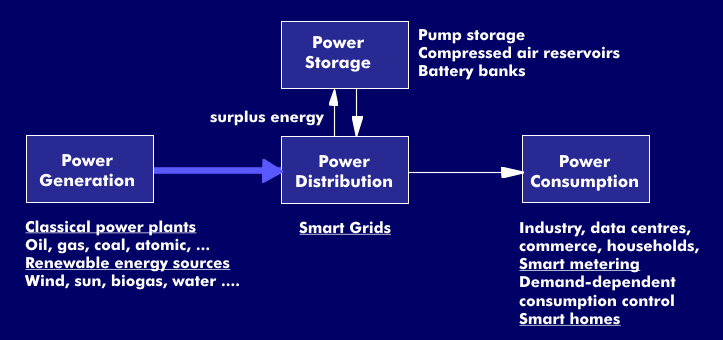Smart Energy
The term smart energy refers to all intelligent technologies for power generation, energy storage, power transmissionand consumption control. The entire value chain from power generation to power consumption is thus addressed. Smart terms have been coined for some of these technologies in recent years. For example, the term smart grid stands for intelligent power transmission and distribution, while the terms smart metering and smart home stand for the control of consumer behavior.
From power generation to power distribution
As far as power generation is concerned, this is characterized by classic power plants for coal, gas and oil and increasingly by ecological power generation from alternative and renewable energies. These technologies include photovoltaic plants, wind turbines, biogas plants, thermal pumps, hydroelectric plants and other technologies. The electricity generated by these power generators must be transmitted to energy storage and consumers via smart distribution networks. Power generation has changed from centralized generation to decentralized generation, involving even the smallest power generators.
Electricity transmission to the consumer
Modern power transmission is characterized by intelligent power grids, super grids and smart grids, which respond to different power feeds and changes in demand. Through them, electricity reaches the end user according to demand, and surplus electricity is stored in energy storage systems. End users are companies, industrial plants, municipalities and private consumers.
Energy storage uses pumped storage and compressed air storage, among others, but increasingly also battery banks and capacitor banks for neighborhood storage. In addition, the smart energy concept envisions using the batteries and power banks of electric vehicles as energy buffers. In the event of short-term fluctuations in demand, the battery charge of the e-cars could be fed back into the smart grids via the smart home. In this case, the e-car would be both an energy storage device and an energy consumer.
On the consumer side, smart metering with tariff-dependent switching on and off of household appliances plays an important role in the private sector. Other energy-saving functions in lighting or other energy-consuming equipment are switched on and off in the smart home via various monitoring and control mechanisms.

